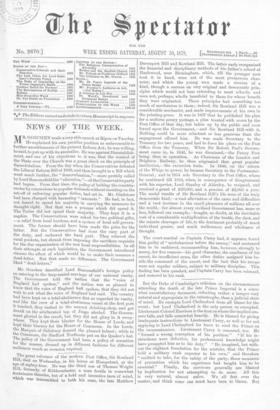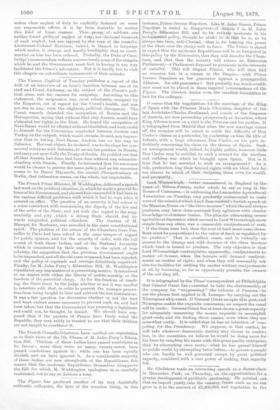But the Duke of Cambridge's criticism on the circumstances attending
the death. of the late Prince Imperial is a some- what unsatisfactory document, reflecting rather a temper very natural and appropriate to the catastrophe, than a judicial state of mind. He exempts Lord Chelmsford from all blame for the event ; but Lord Chelmsford is the only person so exempted. Lieutenant-Colonel Harrison is the first on whom the implied cen- sure falls, and falls somewhat heavily. He is blamed for giving inadequate instructions to Lieutenant Carey, as well as for not applying to Lord Chelmsford for leave to send the Prince on the reconnaissance. Lieutenant Carey is censured, too. He "formed a wrong conception of his position." "If his in- structions were defective, his professional knowledge might have prompted him as to his duty." "He imagined, but with- out the slightest foundation for the mistake, that the Prince held a military rank superior to his own," and therefore "omitted to take, for the safety of the party, those measures of precaution which his experience had taught him to be essential." Finally, the survivors generally are blamed by implication for not attempting to do more. All this is very natural, almost naïve. We all fret over the matter, and think some one must have been to blame. But
unless clear neglect of duty be explicitly fastened on some one responsible officer, it is far from desirable to scatter this kind of looser censure. This group, of , soldiers are neither found guilty of neglect of duty, nor, declared innocent of such neglect, but are Miura by the- tone of the remarks. Lieutenant-Colonel Harrison, indeed, is blamed in language which makes it strange and hardly intelligible that no court- martial on him has been ordered. Probably, the Duke of Cam- bridge's memorandum reflects unconsciously some of the-chagrin which he and the Government must feel, in having in any way facilitated the Prince's adventure. But it is hardly fair to visit this chagrin on subordinate instruments of their mistake.































 Previous page
Previous page